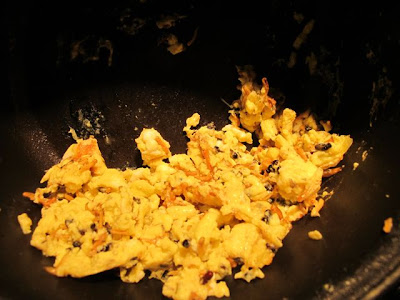I had 21 bluebirds and 15 Carolina chickadees to keep alive, in weather like this: 48 degrees and raining nonstop.
I hand-fed 18 of the bluebirds four times that day (four were too old to feed; I risked causing premature fledging), and after feeding them I left bug omelet on the roofs of their boxes and those of the chickadees, and to a bird each parent fed that stuff to its babies as soon as I was gone. The older babies got fed--I just crept up and put some live mealworms mixed with bug omelet on top of their box and the parents did the rest.
I'd just get back from rounds (some of the boxes are about five miles away from my house) and it would be time to cook up another couple of omelets and head out again. I was thankful for the bluebirds who'd gape for me right off the bat, like this little shaver. Oh, they were hungry!
photo by Liam Thompson
The Carolina chickadees were tricky. They're smarter than bluebirds, and they won't gape for just anybody who whistles at them the way young bluebirds will, so I had to leave food for the parents on their box roofs. It worked. The parents fed it to them.
I found one chickadee baby choking down an enormous green caterpillar. It was swallowing it just like a snake, lying on its belly, working that thing down its gullet, tossing its head back and forth as it forced the oversized item down. Amazing. You can see its tiny wings thrown out for leverage. There are nine in this nest. Thereby hangs another story for another time. Yes, that's my doing, too. Update: All nine of the chicks in the photo below are fledging as of 11 AM Thursday, May 26! Lots of chickadee-dee-deeing going on in the backyard right now, clown-lipped babies popping their heads out of the hole...what joy!
In any clutch, I find the runt (see it at the bottom) usually begs the most vigorously. I love runts. They know they have some catching up to do. These are bluebirds, about Day 6.
Here's a nest of 11-day-old bluebirds with their bug omelet. I use a bent dentist's forceps for feeding. I had to force-feed about half the bluebirds since they wouldn't gape. The older they are, the less likely they are to gape, even if they're starving. They're suspicious of this big colorful ape with a forceps.
The tree swallows sat moping, hungry in the rain, but they ignored both bug omelet and live mealworms placed on their box tops. They'd just step aside as a mealworm would crawl by. Aerial insectivores are very tough to help, being hard-wired to take their food only on the wing.
Hang in there, little swallow. The rain will stop, sometime.
Luckily this pair had only eggs yet laid. Five, and they kept them warm through the cold spell.
It was a heck of a day. I gave up on accomplishing anything but pulling these baby birds through. I just stayed in my rain suit and tromped from box to box.
photo by Liam Thompson
But the rewards were immense--live, warm baby bluebirds and chickadees, who were 100% stronger and healthier at the end of that long, long day than they were at its start. They'd all have died if I hadn't made the effort, and knowing that made it all worthwhile.
photo by Liam Thompson
My photographer was pleased, too.
monkeycam photo by Liam Thompson

















